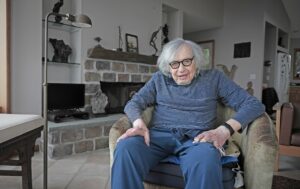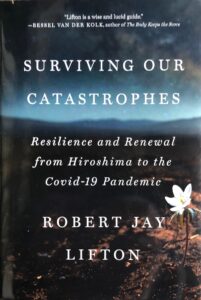Karl Marx famously said, “The philosophers have hitherto only interpreted the world in various ways. The point however is to change it.” But what if interpreting the world is precisely the way to change it? Ordinarily, that question might seem impossibly abstract, but not this year, with its unprecedented challenges to democracy, peace, the health of the planet, and our hopes for children everywhere — including our own children and grandchildren. How, indeed — with all of that — do we change the world?

That question might underlie the work of Robert Jay Lifton, one of the Outer Cape’s most celebrated residents. A psychiatrist, historian, and author of more than a dozen influential books, Lifton has been a prophet of both interpretation and change. Much of his life’s work has taken place at his midcentury modern house on Ocean View Drive in Wellfleet, where he hosted a legendary gathering of eminent scholars and activists that met annually for 50 years. That politically informed group, taking its lead from Lifton’s own approach, resolutely brought ivory-tower preoccupations down to earth. It was sometimes seen as key to the invention of a new intellectual discipline: psychohistory. In that circle, Lifton’s seminars were often referred to simply as “Wellfleet.”
Lifton is now 97. He has left tennis behind and moves carefully, but he is sharper than ever, always attentive to family and friends, acutely attuned to the public challenges of our time, and ever ready with a smile and warm hello. A native of Brooklyn, he is still a diehard Dodgers fan.
For 58 years, until her death in 2010, he was married to Betty Jean Lifton, a well-known writer and open-adoption advocate. Now he lives in Truro with his partner for most of a decade, Nancy Rosenblum, an author and Harvard professor emerita of political theory. She is the widow of the sculptor Richard Rosenblum, who died in 2000. Nancy and Robert are both committed writers, still taking on the great issues of the day. Lately, though, they are jointly at work on a book about finding love later in life.

A marvel of the kind of committed interpretation that Marx wanted, Surviving Our Catastrophes is a distilled confrontation with the most momentous traumas of our time — nuclear dread, the Holocaust, the Vietnam War, the climate crisis, Covid-19, and the Trump-led threat to American democracy. Astonishingly, each of these catastrophes — taken separately and, at times, together — has defined Lifton’s work across three quarters of a century.
He was the first scholar to seek out survivors of the atomic bombing of Japan. His book Death and Life: Survivors of Hiroshima won the 1968 National Book Award, but even more important, it lifted up the voices of persons who until then had been mostly, hibakusha, the “explosion-affected persons.” His experience in Hiroshima made Lifton a lifelong passionate critic of nuclear weapons. He was a leading member, for example, of the anti-nuclear Physicians for Social Responsibility, which shared in the Nobel Peace Prize in 1985.
Home From the War: Vietnam Veterans — Neither Victims nor Executioners, his groundbreaking work based on listening to soldiers themselves and written while the war still raged, was published in 1973. It, too, gave voice to the silenced, affirmed veterans by hearing them out, and helped legitimize the official diagnosis of post-traumatic stress disorder.
In 1986, Lifton published The Nazi Doctors: Medical Killing and the Psychology of Genocide, based on his extensive interviews with death-camp torturers who had medical training. That work underscored the capacity for evil of even the most highly educated and privileged of human beings.
Lifton’s books show how meticulous research, careful interviewing, and profound reflection can produce original insights about critical events, which in turn can inspire legions of readers to take up the challenge of changing the world. There’s the answer to Marx.
The subtitle of the latest book, emphasizing “resilience and renewal,” is the key to Lifton’s genius, the reason his work is so crucially important — now more than ever. After looking directly at the darkest chapters of contemporary history, Lifton rejects the fatalism and despair that undermine possible solutions to grave social disorders. He looks into the abyss, as he once said, to see beyond it.
That principle, of course, is key to every kind of therapy. Psychiatrists, in traditional one-on-one treatment, engage with those at the mercy of meaninglessness, aiming to help them find in their own stories the sources of meaning itself. But Lifton’s integration of psychiatry and history shows how the personal is always social and how individual longing can become collective purpose. “Meaning,” he writes, “depends upon memory.” But memory is not mere nostalgia. Nostalgia, from the Greek for “longing for home,” can imprison a person in a past that actually never was, a home that cannot be revisited.
That is especially true now, when American reactionaries have yoked dynamite to nostalgia, turning it into a force for white supremacy and Christian nationalism. Lifton, by contrast, continually returns to the past, its traumas and catastrophes, but never sentimentally and never in the service of lost-cause mythologies, conspiracies, or cults of martyrdom. Instead, he always has an eye on the past’s present significance — precisely for renewal. Even grief and pain and loss when shared, Lifton insists, can become the seeds of solidarity, which, transcending solipsism, is the ultimate source of meaning.
Lifton’s psychiatric practice has been less as a therapist than as a witness. Indeed, he titled his 2011 memoir Witness to an Extreme Century. His method, like that of every good counselor, boils down to empathetic listening, rooted in medical wisdom, and a habit of critical thinking. But his vocation as what he calls a “witnessing professional” depends also on the astute political awareness essential to his gift for world-changing interpretation. Again and again, he finds ways of paying attention to what other observers often ignore or simply deny.
And what he learns from the hibakusha; from the victims of Auschwitz doctors; from Vietnam veterans; from the survivors of brainwashing and inhuman cults; from struggling environmentalists; and from the many stunned to this day by the grief and dislocations of Covid-19 — what he learns in every instance is that human beings have an innate capacity to surpass themselves.
Lifton insists that resilience and renewal are not exceptional responses to catastrophe but reliable forms of what he calls “survivor agency.” Grief is not the obstacle to transformation but its threshold. “The process of mourning” — this is his life’s summary, offered in the new book — “is at the heart of our struggle to consolidate survivor meaning and embark on a survivor mission of renewal.” There it is: to discover meaning is to accept a mission, just as interpreting the world is changing it.
Robert Jay Lifton, whose courageous life’s work makes him a connoisseur of darkness, believes in human beings. Human beings are the light. Therefore, why should this man not have made his truest home on the Outer Cape, which, with air and sand and sea and sky, is famous for nothing more than its luminescence? And why, finally, should we his lifelong neighbors not honor him as our dear connoisseur, above all, of hope?
James Carroll’s most recent book is The Truth at the Heart of the Lie: How the Catholic Church Lost Its Soul.
